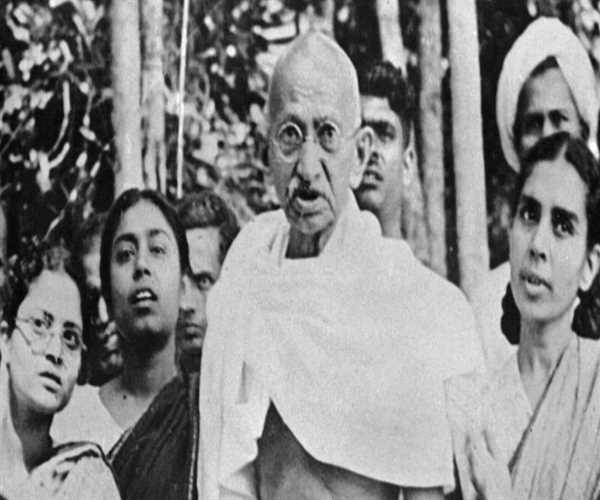
11-Apr-2024 , Updated on 4/22/2024 12:42:18 AM
Does Mahatma Gandhi really deserve to be called the Father of the Nation?
The title "Father of the Nation" given to Mahatma Gandhi in India is powerful and emotional. It represents his deep appreciation and admiration for leading the fight for freedom from British tyranny. However, the title is not without its critics. To comprehend the significance of this appellation, we must go deeper into the reasons for and against Gandhi as the only inheritor of this title.
Arguments supporting Gandhi as the Father of the Nation:
The Architect of Satyagraha: Without a doubt, Gandhi's most significant contribution to India's liberation struggle was his idea of Satyagraha, or nonviolent resistance. This powerful philosophy, founded on truth and non-cooperation, rallied millions of Indians and drew international attention to the cause. The movement became known for its peaceful rallies, boycotts, and civil disobedience, which challenged British authority without resorting to violence. Satyagraha resonated with the public by providing a dignified and effective road to self-rule.
A Unifying Force:
India is a patchwork of various religions, ethnicities, and social classes. Gandhi's message of unity bridged these divides. He championed the cause of all Indians, promoting religious tolerance and social fairness. His emphasis on nonviolence cultivated a feeling of national unity, uniting various communities under the banner of freedom.
Moral Compass of the Nation:
Gandhi was not just a political leader, but also a moral exemplar. His dedication to the truth, his simple lifestyle, and his steadfast ideals inspired millions. He set an example by displaying the strength of peaceful opposition and the significance of fighting for what is right, especially in the face of hardship. Gandhi's personal integrity served as a light of hope during the struggle for independence.
Arguments Against Gandhi as Father of the Nation:
Shared Glory:
Although Gandhi was unquestionably the most visible person in the independence struggle, he was not alone. Numerous independence warriors gave their life to the cause; Bhagat Singh's revolutionary spirit, Subhash Chandra Bose's demand for armed resistance, and Rani Lakshmibai's rejection of the British Raj all demonstrate the multifaceted nature of the struggle. Attributing the title only to Gandhi undervalues the achievements of these other heroes.
Evolving beliefs:
Gandhi's social and political beliefs, notably on caste and women's rights, are regarded out of date in modern India. His critics believe that these ideas undermine his claim to be the single spokesperson of a diverse nation.
An Unofficial Title:
Interestingly, the Indian government has never formally bestowed the title "Father of the Nation" on Gandhi. The designation is based on popular feeling and overwhelming admiration for his leadership.
A Legacy That Lasts:
Despite the reasons against it, the title "Father of the Nation" is extremely significant. It illustrates Gandhi's widespread regard throughout India. His role in the independence movement, doctrine of nonviolence, and moral stature made him a pivotal figure in the country's history. While other freedom fighters have made significant contributions, Gandhi's status as a vital actor in molding a free India cannot be denied. The title is a sign of his enduring legacy, a tribute to the man who guided a nation towards a better future.
Other sides of Gandhi that most of us don't know about:
Gandhi sometimes failed to understand the depths of politics and the harsh reality of human nature due to his confidence in people's pure nature. Even while it was successful in many instances, his theory of peaceful protest wasn't always effective when terrible oppression and violence were present.
Gandhi's views on untouchability and the caste system have come under fire for being both too conventional and not radical enough. Even though he wished to eliminate untouchability, some of his attitudes and actions served to maintain caste divisions. For instance, he did not forcefully oppose discrimination based on caste and was in favor of the varna system.
Gandhi's ideas have received a lot of criticism for being archaic and patriarchal in contrast with today's standards. He maintained traditional opinions about women's place in society, frequently restricting them to household responsibilities and encouraging traditions like early marriage. Critics have also pointed to his unorthodox ways of proving his self-control, such as sharing a bed with young ladies, and his experiences with fidelity.
Gandhi's rejection of modern industrialization and support for an independent, rural economy have been seen by some as impractical and harmful to India's progress. Even though he supported cottage businesses and rural industries, his opposition to massive industrialization could have ultimately slowed India's economic development.

CONTENT WRITER
Writing is my thing. I enjoy crafting blog posts, articles, and marketing materials that connect with readers. I want to entertain and leave a mark with every piece I create. Teaching English complements my writing work. It helps me understand language better and reach diverse audiences. I love empowering others to communicate confidently.
Join Our Newsletter
Subscribe to our newsletter to receive emails about new views posts, releases and updates.
Copyright 2010 - 2026 MindStick Software Pvt. Ltd. All Rights Reserved Privacy Policy | Terms & Conditions | Cookie Policy